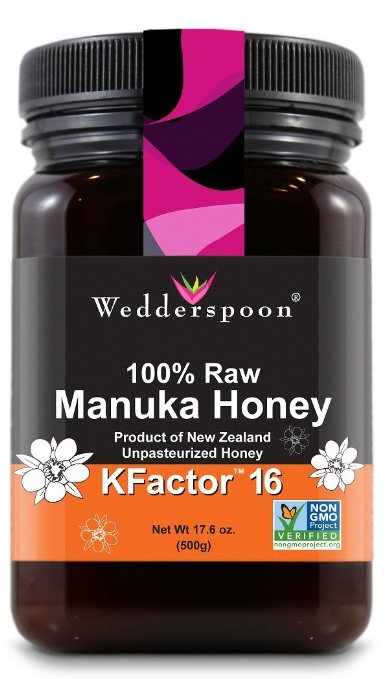Books |
Manuka Honey
By
Published: Mar 14, 2022
Category:
Food and Wine
Manuka honey comes from New Zealand, where it’s made by bees that feed on the nectar of the manuka tree. Their honey is dark and thick. Its aroma has been described as “damp earth, heather, aromatic.” I can attest that the taste is slightly bitter — you are tempted to think, “You know, this might be better with a little honey in it.”
The rating of the honey is important. A KFactor of 10 to 12 tells you that no more 65% of the pollen grains in the honey are manuka pollen — given the price, you might as well buy any organic honey. A KFactor of 16 tells you that 75% of the pollen is manuka pollen — that’s where experts set the bar. A KFactor of 22 brings the pollen count up to 90% — and you pay for that purity.
I buy Wedderspoon Manuka Honey with a KFactor 16+. As you’ll see, this brand is ranked #4 of the 10 rated here. [To buy Wedderspoon 100% Raw Premium Manuka Honey with a KFactor 16+ from Amazon, click here.]
Some consumer warnings. Infants shouldn’t eat this honey — or any — in the first 12 months. Diabetics should note the high glucose content of this honey and either stay away from it or take it in very small amounts. For everyone else, 1-2 teaspoons a day is quite sufficient.
Benefits? Start with the first thing that manuka lovers tell you: You’ll be more resistant to disease. It’s not just the nutritional value of the honey –– major doses of amino acids, enzymes and B-complex vitamins, particularly thiamin (B1), riboflavin (B2), niacin (B3), pantothenic acid (B5), and B6. Even better, this honey contains substances that stimulate production of cytokine, the proteins involved in strengthening the body’s immune system and helping it fight off pathogens and diseases.
This honey is also a cough remedy and a balm for sore throats. It relieves sinusitis. Its high antimicrobial content makes it a favored treatment for gastritis. Its anti-bacterial power is effective in other stomach ailments. It is said to reduce gingivitis. It has a role in reducing high cholesterol. And in 2010, manuka honey was approved by the National Cancer Institute to treat inflammation of the esophagus because of chemotherapy.
And then there are the benefits of this honey in skin care. On the scalp, it’s a moisturizer that relieves dandruff. Smeared on the face, it reduces rosacea, eczema and hives. I’ve always used Egyptian Magic for cuts and scrapes, but this honey is said to be useful with those.
Here’s another endorsement, from a New York Times piece about Laura Dern. She said:
“Lately, I’ve been doing matcha green tea with my whisk, and I really love it. I put manuka honey in it. My children are like: “Mom! That honey is odd.” But then when they don’t feel well, I make them hot water with fresh ginger, manuka honey and a dash of cayenne. Drink that tea, and life is good.”
Scarlett Johansson washes her face, then rubs a spoonful of this honey on her skin:
“It really adds an amazing glow and your skin is so soft afterwards. It pulls out the impurities — and it’s a nice foundation, especially if you are going to a big event where you want a great glow.”
The irony of manuka honey’s high price is that it was, for centuries, ignored, even despised for its aroma and flavor. Until 1981, it was considered a low-grade honey that was so unappealing it was added to cattle feed or thrown away. Now we know better.


